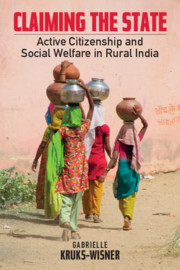
-
Select format
-
- Publisher:
- Cambridge University Press
- Publication date:
- 04 August 2018
- 16 August 2018
- ISBN:
- 9781108185899
- 9781107199750
- 9781316649008
- Dimensions:
- (228 x 152 mm)
- Weight & Pages:
- 0.6kg, 336 Pages
- Dimensions:
- (228 x 152 mm)
- Weight & Pages:
- 0.49kg, 336 Pages
You may already have access via personal or institutional login
Book description
Citizens around the world look to the state for social welfare provision, but often struggle to access essential services in health, education, and social security. This book investigates the everyday practices through which citizens of the world's largest democracy make claims on the state, asking whether, how, and why they engage public officials in the pursuit of social welfare. Drawing on extensive fieldwork in rural India, Kruks-Wisner demonstrates that claim-making is possible in settings (poor and remote) and among people (the lower classes and castes) where much democratic theory would be unlikely to predict it. Examining the conditions that foster and inhibit citizen action, she finds that greater social and spatial exposure - made possible when individuals traverse boundaries of caste, neighborhood, or village - builds citizens' political knowledge, expectations, and linkages to the state, and is associated with higher levels and broader repertoires of claim-making.
Awards
Winner (for Manuscript), 2018 Joseph W. Elder Prize, American Institute of Indian Studies
Reviews
‘Studies in political science are often written as if citizens interact with the state only during elections. Yet, as Gabrielle Kruks-Wisner shows in her remarkable book, many of the most important interactions that people in rural Rajasthan have with state actors - about access to water, electricity, healthcare, food, shelter, and other forms of social protection - are almost daily activities. This makes it crucial to understand the conditions under which citizens do (or don't) make claims for these services. Claiming the State provides compelling answers, and in so doing, provides new and important insights into how citizens in poor countries interact with their governments.'
Daniel N. Posner - James Coleman Professor of International Development, University of California, Los Angeles
‘Kruks-Wisner rightly notes scholars of political participation have remained preoccupied with exceptional or episodic moments: mass mobilizations, armed struggles, voting, and campaign rallies. In doing so, they have neglected the quotidian forms of participation that define the political lives of most citizens across the global south. Her book rightly shifts attention to everyday claim-making, and asks important questions: who makes claims, when, and how? Using meticulously collected data from north India she finds surprising answers: claim-making is not the exclusive purview of men, urbanites, the wealthy, or the socially privileged. It can occur in even the most unlikely pockets, especially when citizens develop social and economic networks extending beyond their locality or social group. Claiming the State should have a sizeable impact in reorienting studies of political participation towards life between elections, and in how we think of the practice of citizenship in contemporary India.'
Tariq Thachil - Vanderbilt University, Tennessee
Contents
Metrics
Altmetric attention score
Full text views
Full text views help Loading metrics...
Loading metrics...
* Views captured on Cambridge Core between #date#. This data will be updated every 24 hours.
Usage data cannot currently be displayed.
Accessibility standard: Unknown
Why this information is here
This section outlines the accessibility features of this content - including support for screen readers, full keyboard navigation and high-contrast display options. This may not be relevant for you.
Accessibility Information
Accessibility compliance for the PDF of this book is currently unknown and may be updated in the future.


